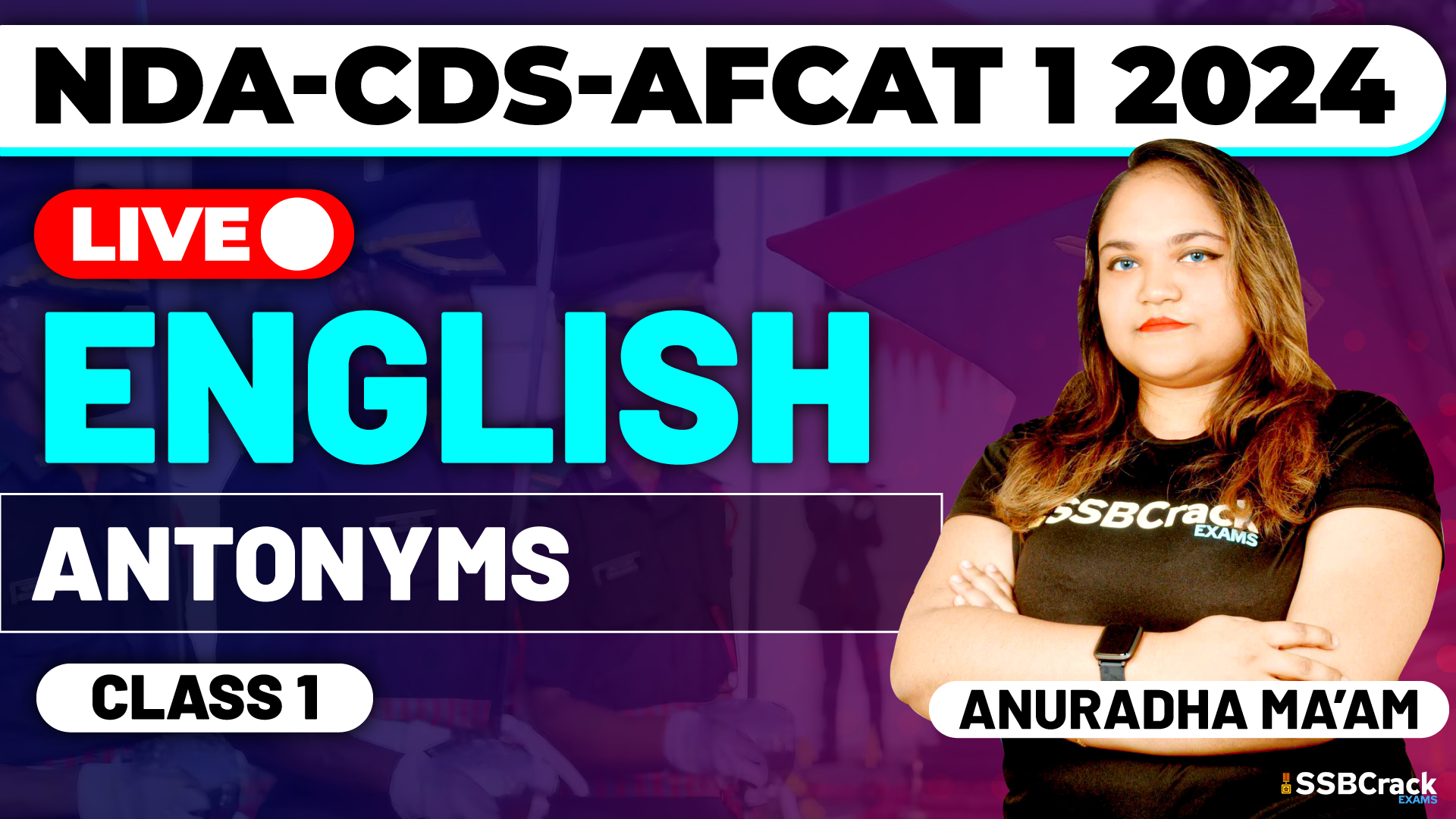The path to success in the National Defence Academy (NDA), Combined Defence Services (CDS), and Air Force Common Admission Test (AFCAT) examinations is characterized by a comprehensive evaluation of a candidate’s knowledge and skills. Within the multifaceted arena of the English section, “Antonyms” stands as a defining component. This segment challenges candidates to identify words or phrases that are opposite in meaning to a given word. In this article, we will explore the pivotal role of antonyms in these esteemed examinations and discuss strategies to master this aspect effectively.
Directions: Each item in this section consists of a sentence with an underlined word followed by four words/group of words. Select the option that is opposite in meaning to the underlined word and mark your response on the answer sheet accordingly.
Q) He agreed reluctantly to sign the form but looked ill at ease.
(a) embarrassed
(b) comfortable
(c) welcome
(d) easy
Ans. (b)
Q) A small altercation between the children started off a riot.
(a) quarrel
(b) friendly discussion
(c) contest
(d) race
Ans. (b)
Q) This cloth is coarse of touch.
(a) Delicate
(b) Rough
(c) Painful
(d) Harsh
Ans. (a)
Q) The guest made derogatory remarks about the food he was served.
(a) Interesting
(b) Complimentary
(c) Unnecessary
(d) Cheerful
Ans. (b)
Q) The state government for its part can identify vulnerable villages where these forces can be stationed.
(a) important
(b) famous
(c) remote
(d) invincible
Ans. (d)
Q) He was asked to accelerate the pace of work.
(a) check
(b) control
(c) slacken
(d) supervise
Ans. (c)
Q) He was deeply hurt by her curt reply.
(a) abrupt
(b) short
(c) expansive
(d) rude
Ans. (c)
Q) The three states signed a pact to have collective economy.
(a) distributive
(b) disintegrative
(c) individual
(d) divided
Ans. (c)
Q) The judge thought that the offence was deliberate.
(a) negligible
(b) casual
(c) unintentional
(d) legitimate
Ans. (c)
Q) I was deeply affected by his urbane behaviour.
(a) rural
(b) indifferent
(c) rude
(d) unsympathetic
Ans. (c)
For more questions, check out NDA CDS AFCAT 1 2024 Exam English Antonyms Live Class 1
Deciphering the Significance of Antonyms
Antonyms, or opposites, are words or phrases that convey the opposite meaning of a given word. In the context of these examinations, candidates are required to discern the antonym of a specific word from a set of options. This not only measures vocabulary but also evaluates a candidate’s ability to recognize contextual nuances and word relationships.
The Importance of Antonyms in NDA, CDS, and AFCAT Exams
- Diverse Vocabulary: The skill to identify antonyms showcases the breadth and depth of a candidate’s vocabulary. In the armed forces, a rich and diverse vocabulary is indispensable for precise communication.
- Contextual Understanding: Antonyms are a litmus test of a candidate’s ability to discern meaning within different contexts. This skill is invaluable when interpreting complex military documents and instructions.
- Critical Thinking: Antonym-based questions necessitate critical thinking and analytical skills. Candidates must assess the provided options to select the word that is opposite in meaning to the given word, a trait essential for decision-making in high-pressure scenarios.
- Effective Communication: The military relies on effective communication for the dissemination of orders, strategies, and tactical plans. Proficiency in antonyms contributes to clear and concise communication.
- Language Mastery: Proficiency in antonyms signifies an all-encompassing command of the English language, underlining an aspirant’s dedication to mastering language skills, a fundamental quality highly regarded in the military.
Strategies to Master Antonyms
- Read Actively: Regularly read diverse materials like books, newspapers, and magazines to expand your vocabulary.
- Understand Context: Focus on the context in which a word is used to determine its meaning accurately.
- Mnemonic Devices: Employ memory aids and mnemonic techniques to remember antonyms more effectively.
- Practice Antonym Exercises: Engage in antonym exercises and quizzes to refine your skills.
- Create Antonym Flashcards: Develop flashcards with words and their antonyms for easy review and retention.
- Thematic Learning: Group antonyms thematically to aid memory and comprehension.
- Online Resources: Utilize online resources and apps designed to facilitate vocabulary expansion and antonym learning.
Conclusion
The ability to identify antonyms is more than an academic requirement; it signifies linguistic proficiency, cognitive agility, and intellectual acumen. In the NDA, CDS, and AFCAT examinations, mastery of antonyms is a pivotal factor for gaining a competitive edge. It not only equips candidates for the diverse challenges of a military career but also aligns with the core values of precision, effective communication, and intellectual dexterity that are at the heart of a successful officer in the armed forces. Aspirants should recognize that proficiency in antonyms is not just a test requisite; it is a step towards becoming a well-rounded, effective military officer.







